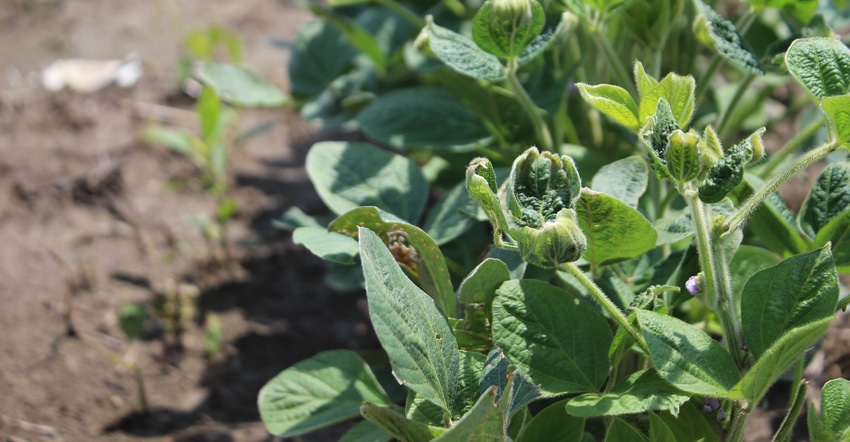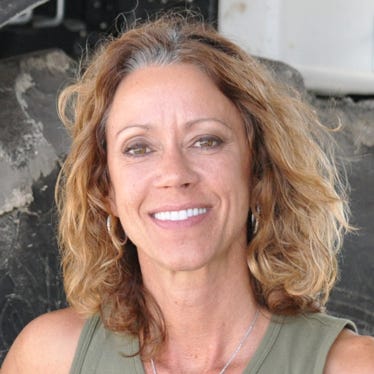
In-season dicamba’s inaugural year left behind thousands of damaged acres and several unanswered questions in Illinois. Despite those questions, there’s one thing Jean Payne, Illinois Chemical and Fertilizer Association president, knows for sure: “This label expires at the end of 2018,” she says. “If the industry wants it, it’s up to us to do a better job keeping it on target.”
2018 marks a new application season with new rules, Payne adds, and it starts with training.
The new agreement between U.S. EPA and Monsanto, BASF and DuPont, which reclassified dicamba as a restricted-use pesticide and addressed ways to minimize off-target dicamba damage, empowered each state to determine dicamba training.
“Every state is a little different,” Payne says, noting that Missouri has more restrictions, and Extension agents will train applicators. The Arkansas Plant Board voted to ban in-season dicamba applications in 2018.
Illinois will follow the U.S. EPA labels for Engenia, XtendiMax and FeXapan, Payne says, and the ag industry is pooling resources to provide training.
The Illinois Fertilizer and Chemical Association, Illinois Department of Agriculture, Illinois Farm Bureau, University of Illinois, Illinois Soybean Association and Illinois Corn Growers Association met to arrange free training sessions to be held throughout the state. (See dates and locations below for details.)
BASF and Monsanto will provide course instructors. Additional locations will be added each week, particularly in southern Illinois, and Payne encourages certified applicators and farmers to check the Illinois Dicamba Training website often. IFCA’s new website houses training locations, dates and dicamba-related resources, including the new dicamba labels, record-keeping forms, inversion guidelines and PSI application guides.
A new year
Given the 2017 in-season dicamba experience and unsolved off-target damage, will the new rules and training equal a successful application season? Payne says an Iowa farmer who applied Engenia in 2017 summed it up best: “You can’t be lucky. You have to be good.”
Retailers may evaluate their approach, Payne adds, and consider dedicated tenders and sprayers now that demand for dicamba should make devoting equipment more economically feasible. “Tank contamination issues will improve,” she says. “We now realize how little dicamba it takes hiding in the tank or boom to cause damage.”
Wind speed violations were common last year, she says, and new label guidelines state “do not apply” when sensitive crops are downwind.
“If people embrace the label, we should have a better experience,” she notes. “But they have to take the training seriously.”
The 2017 application season left behind more than questions — there are a lot of hard feelings. “We used to hear the words ‘chemical trespass’ from environmental groups, and now it’s in ag,” Payne says. “That tells me there is a lot of sensitivity out there.”
Training will reinforce that every field is not a candidate for dicamba applications, such as an Xtend field bordered by LibertyLink, non-GMO or organic soybeans, or other sensitive crops.
 OPEN DIALOGUE: Jean Payne, Illinois Chemical and Fertilizer Association president, hopes the classroom-style dicamba training sparks conversations between applicators and trainers.
OPEN DIALOGUE: Jean Payne, Illinois Chemical and Fertilizer Association president, hopes the classroom-style dicamba training sparks conversations between applicators and trainers.

Payne encourages everyone in the industry who may have interest in using dicamba, like landowners and neighboring farmers, to attend the free training sessions. “People really have to take a step back and respect their neighbors,” she says. “This is where communication between landowners has to be better, in terms of what is going to be planted next to your field. There has to be mutual respect.”
Training dates and locations
Dates and locations may change; please check the Illinois Dicamba Training website for more information.
Nov. 29 Springfield, 4:30-6 p.m.
Dec. 5 Carterville, 3-5 p.m.
Dec. 8 Champaign, 3-5 p.m.
Dec. 1 Hamel, 10 a.m.-12 p.m.
Dec. 12 Girard, 3-5 p.m.
Dec. 13 Utica, 3-5 p.m.
Dec. 14 Sandwich, 4:30-6 p.m.
Dec. 15 Sandwich, 4:30-6 p.m.
Dec. 19 Champaign, 4:30-6 p.m.
Jan. 3 Galesburg, 3-5 p.m.
Jan. 4 Peoria, 4:30-6 p.m.
Jan. 5 Peoria, 4:30-6 p.m.
Jan. 10 Danville, 9-11 a.m.
Jan. 10 Rock Falls, 3-5 p.m.
Jan. 23 Galesburg, 9-11 a.m.
Jan. 26 Bloomington, 3-5 p.m.
Jan. 30 Macomb, 9-11 a.m.
Jan. 31 Roanoke, 9-11 a.m.
Feb. 6 Jacksonville, 4:30-6 p.m.
Feb. 7 Jacksonville, 4:30-6 p.m.
Feb. 8 Quincy, 3-5 p.m.
Feb. 16 Effingham, 3-5 p.m.
Feb. 22 Kankakee, 3-5 p.m.
March 9 Champaign, 3-5 p.m.
March 12 Peoria, 3-5 p.m.
March 21 Moline, 3-5 p.m.
March 28 Rockford, 3-5 p.m.
About the Author(s)
You May Also Like




